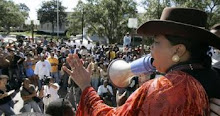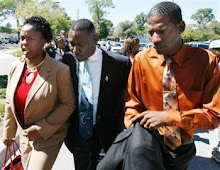
October 12, 2007
By Patrick J. Lyons
It took only 90 minutes today for a jury in Panama City, Fla., to decide that the juvenile boot-camp instructors who beat, kicked and kneed a 14-year-old boy, Martin Lee Anderson, were not guilty of killing him. A nurse at the camp was acquitted as well.
Press reports have noted that the jury was all white and the boy was black, and suggested that there was a racial element to the decision. (Some of the defendants were white, some black, and one was Asian.)
There was also conflicting medical testimony presented at the trial, with some witnesses saying that sickle-cell disorder — and not the actions of the guards and the nurse, which were seen in court in surveillance videotape from the camp — was the main reason the boy collapsed and died.
Even so, the jury’s decision fit with a longstanding pattern: When a youth who has been sent to one of these programs dies or is badly abused, the odds are that no one will be held responsible.
Just this week, a federal government report came to that conclusion after studying hundreds of complaints of abuse, torture, horrific conditions and deaths at juvenile boot camps, as Diana Jean Schemo wrote in The New York Times on Thursday:
The report, by the Government Accountability Office, the investigative arm of Congress, examined the cases of 10 teenagers who died while at programs in six states, finding “significant evidence of ineffective management” and “reckless or negligent operating practices.” The report detailed evidence that teenagers were starved, forced to eat their own vomit, and to wallow for hours in their own excrement.
In one instance, a boy was so dehydrated that he ate dirt to survive, according to witnesses and an autopsy.
Investigators also found that owners and employees were seldom sent to prison, even when teenagers died in their care. Five of these programs are still in operation, some under new names or in other states.
The G.A.O. report, which refers to the boot camps as “residential treatment programs” for “troubled youth,” is posted in its entirety here (pdf) and summarized here (html).
As Ms. Schemo reported, the boot-camp industry has insisted for years that accusations of mistreatment and worse are, in the words of a trade group, “the noisy complaints of a few individuals.” (The trade group doesn’t call them boot camps, either, at least in its name: the National Association of Therapeutic Schools and Programs.)
The noise has sometimes made a difference. When past incidents, like the death of 16-year-old Aaron Bacon in Escalante, Utah, in 1994, broke into public view, some states moved to shut down the worst operators, step up oversight of the camp programs and improve conditions in them, and the Anderson case has spurred such an effort in Florida. But in other states, the camps remain completely unregulated, and critics say it is only a matter of time before the next Aaron Bacon or Martin Lee Anderson hits the headlines.





